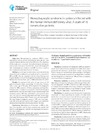Identificador persistente para citar o vincular este elemento:
https://accedacris.ulpgc.es/jspui/handle/10553/73794
| Título: | Hemophagocytic syndrome in patients infected with the human immunodeficiency virus: A study of 15 consecutive patients | Otros títulos: | Síndrome hemofagocítico en pacientes infectados con el virus de la inmunodeficiencia humana: Un estudio en 15 pacientes consecutivos | Autores/as: | Suárez Hormiga, Laura Jaén Sánchez, María Nieves Verdugo-Espinosa, Edwin Andrés Carranza-Rodríguez, Cristina Hernández Cabrera, Pilar Michele Pisos Álamo, Elena Francés-Urmeneta, Adela Pérez Arellano, José Luis |
Clasificación UNESCO: | 32 Ciencias médicas | Palabras clave: | Síndrome hemofagocítico VIH Síndrome de inmunodeficiencia adquirida Terapia antirretroviral Herpesvirus humano 8, et al. |
Fecha de publicación: | 2020 | Publicación seriada: | Revista Espanola de Quimioterapia | Resumen: | Objetivos. El síndrome hemofagocítico (HPS) se caracteriza por varios datos clínicos y biológicos derivados de la hiperproducción de citocinas y proliferación celular. Los objetivos
fueron evaluar las características epidemiológicas, etiológicas, clínicas y evolutivas de los pacientes con diagnóstico de síndrome hemofagocítico e infección por VIH así como su comparación con los datos bibliográficos. Pacientes y métodos. Se realizó un estudio observacional descriptivo retrospectivo incluyendo todos los pacientes adultos con diagnóstico de HPS e infección por VIH, atendidos en
la Unidad de Enfermedades Infecciosas y Medicina Tropical del Hospital Universitario Insular de Las Palmas de Gran Canaria desde 1 de junio 1998 hasta 31 de diciembre de 2018.
Resultados. Se analizó una serie de casos de 15 pacientes, observando un mayor porcentaje de varones con edad media de 42 años. En cuanto a los criterios de HPS se observa que la presencia de fiebre, citopenias e hiperferritinemia era constante en todos los pacientes. Las manifestaciones clínicas neurológicas fueron frecuentes y ausente la clínica respiratoria. Se confirmó HPS en algunos pacientes sin inmunodepresión grave y carga viral indetectable. Además, un 40% de los casos no recibían ART. Las causas desencadenantes de HPS más frecuentes fueron las víricas, especialmente HHV-8. Además, se identificaron dos nuevos agentes desencadenantes de HPS: Blastocystis dermatitidis y Mycobacterium chelonae Conclusión. La administración de tratamiento en HPS es arbitraria lo que unido a su alta tasa de mortalidad e infradiagnóstico indican la importancia de continuar realizando estudios futuros. Hemophagocytic syndrome (HPS) is char-acterized by various clinical and biological data derived from cytokine hyperproduction and cell proliferation. The objectives of this study were to evaluate the epidemiological, etiological, clinical and evolutionary characteristics of patients diagnosed with hemophagocytic syndrome and HIV infection, as well as their comparison with data from the literature. Methods-A retrospective descriptive observational study was performed, including all adult patients with a diagnosis of HPS and HIV infection treated in the Infectious Diseases and Tropical Medicine Unit of the Hospital Universitario Insular, Las Palmas, Gran Canaria from June 1, 1998 to December 31, 2018. Results. An analysis of this series of case reports of 15 patients showed a higher percentage of males than females, with a mean age of 42 years. With respect to the diagnostic criteria for HPS, presence of fever, cytopenias and hyperfer-ritinemia were a constant in all patients. Clinical neurological manifestations were frequent and clinical respiratory signs and symptoms absent. HPS was confirmed in some patients who were not severely immune-depressed and had undetectable viral loads. Furthermore, 40% of cases were not receiving ART. The most frequent triggering causes of HPS were viral, especially HHV-8. In addition, two new HPS triggers were identified: Blastocystis dermatitidis and Mycobacterium chelonae. Conclusion. Administration of treatment in HPS is arbitrary. This, together with the high mortality rate and the fact that it is underdiagnosed, indicates the importance of conducting future studies. |
URI: | https://accedacris.ulpgc.es/handle/10553/73794 | ISSN: | 0214-3429 | DOI: | 10.37201/req/037.2020 | Fuente: | Revista Española de Quimioterapia [ISSN 0214-3429], v. 33 (4), p. 249-257, (Enero 2020) |
| Colección: | Artículos |
Citas SCOPUSTM
2
actualizado el 08-jun-2025
Citas de WEB OF SCIENCETM
Citations
4
actualizado el 01-mar-2026
Visitas 5
125
actualizado el 10-ene-2026
Descargas
67
actualizado el 10-ene-2026
Google ScholarTM
Verifica
Altmetric
Comparte
Exporta metadatos
Los elementos en ULPGC accedaCRIS están protegidos por derechos de autor con todos los derechos reservados, a menos que se indique lo contrario.
